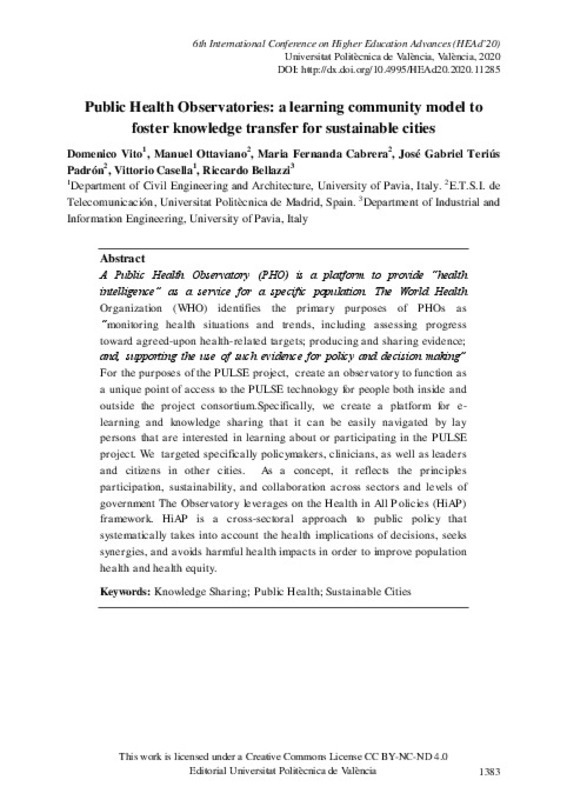JavaScript is disabled for your browser. Some features of this site may not work without it.
Buscar en RiuNet
Listar
Mi cuenta
Estadísticas
Ayuda RiuNet
Admin. UPV
Public Health Observatories: a learning community model to foster knowledge transfer for sustainable cities
Mostrar el registro completo del ítem
Vito, D.; Ottaviano, M.; Cabrera, MF.; Teriús Padrón, JG.; Casella, V.; Bellazzi, R. (2020). Public Health Observatories: a learning community model to foster knowledge transfer for sustainable cities. En 6th International Conference on Higher Education Advances (HEAd'20). Editorial Universitat Politècnica de València. (30-05-2020):1383-1390. https://doi.org/10.4995/HEAd20.2020.11285
Por favor, use este identificador para citar o enlazar este ítem: http://hdl.handle.net/10251/146332
Ficheros en el ítem
Metadatos del ítem
| Título: | Public Health Observatories: a learning community model to foster knowledge transfer for sustainable cities | |
| Autor: | Vito, Domenico Ottaviano, Manuel Cabrera, Maria Fernanda Teriús Padrón, José Gabriel Casella, Vittorio Bellazzi, Riccardo | |
| Fecha difusión: |
|
|
| Resumen: |
[EN] A Public Health Observatory (PHO) is a platform to provide “health intelligence” as a service for a specific population. The World Health Organization (WHO) identifies the primary purposes of PHOs as “monitoring health ...[+]
|
|
| Palabras clave: |
|
|
| Derechos de uso: | Reconocimiento - No comercial - Sin obra derivada (by-nc-nd) | |
| ISBN: |
|
|
| Fuente: |
|
|
| DOI: |
|
|
| Editorial: |
|
|
| Versión del editor: | http://ocs.editorial.upv.es/index.php/HEAD/HEAd20/paper/view/11285 | |
| Título del congreso: |
|
|
| Lugar del congreso: |
|
|
| Fecha congreso: |
|
|
| Código del Proyecto: |
|
|
| Agradecimientos: |
PULSE project has been founded by the European Union’s Horizon 2020 research and innovation programme, and it is documented in the grant agreement No 727816.
Specifically. PULSE has been founded under the call H2020-EU-3.1.5. ...[+]
|
|
| Tipo: |
|








